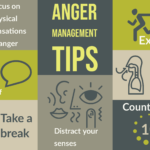Identifying the underlying feelings that are fueling your anger can be helpful. Anger is a defence mechanism that helps you suppress more unpleasant feelings like shame, guilt, and disappointment.
Also Read: CBDT issues fresh guidelines for tax exemptions on life insurance policy
If someone gives you some unflattering feedback, for instance, you might react angrily because of the shame you feel. If you’re feeling embarrassed, convincing yourself that the other person is evil for criticising you might help. However, recognising underlying feelings can aid in identifying the real issue at hand. After that, you can select what steps to take next.
Signs of Anger Issues
McInnis posits a wide range of symptoms associated with poor anger regulation, such as:
It appears that the person is frequently irritated, either by oneself or by other people.
When confronted with basic inquiries, this individual often loses their cool.
There is no clear cause for the person’s constant state of rage or tension.
When angered, the person acts violently.
The person is prone to harbouring resentment and fantasising about hurting the other party.
Verbal, emotional, or bodily harm is done by the person.
The person’s reactions to minor irritations or trivial matters are out of all proportion to the severity of the annoyances or matters at hand.
This person has zero tolerance for flaws or vulnerabilities in others.
Remembering upsetting experiences makes the person angry.
They frequently display moods of melancholy and pout.
Impact of Anger Issues
Anger may appear productive in the moment; a parent who yells at their children may feel satisfied if the youngsters eventually clean their rooms. Anger problems may seem minor at first, but they can have serious consequences for a person’s health, relationships, career, and general happiness over time.2
Impact on Relationships
McInnis describes several ways in which anger might disrupt a person’s social life:
When interacting with someone who has anger management problems, friends, family, and coworkers may feel like they need to tread carefully.
Relationships are negatively affected when the person’s explosive rage makes it difficult for others to trust them, speak openly with them, or feel comfortable in their presence.
Because of the negative impact their anger has on those around them, the individual may begin to feel alone.
Impact on Physical Health
Anger is a complex mental and physical condition characterised by increased activity and other physical modifications. These modifications include:2
Tense muscles
Racing heart
hypertension High blood pressure
hormone surge including adrenaline
Physical health can be negatively affected by experiencing anger frequently, intensely, or for extended periods of time. Long-term physical ramifications of unrestrained rage, as described by McInnis, can
How to Help Someone Who Has Anger Issues
If a loved one of yours is struggling with anger control, you probably want to do what you can to assist them. McInnis provides advice on how to assist the group.
Urge Them to Seek Professional Help
Insist that they consult a mental health expert like a therapist. Anger management and anger-related concerns are common areas of expertise for therapists. Anger can be treated by a variety of therapeutic approaches, including:2
Sensorimotor psychotherapy:
Sensorimotor psychotherapy is a body-oriented form of psychotherapy that places special emphasis on the ways in which traumatic experiences and other emotions are physically retained. Movement is used to help in healing from trauma and releasing negative emotions like rage.5
Somatic experiencing (SE):
Somatic Experiencing (SE): Somatic Experiencing, like EMDR, emphasises the relationship between the body and the mind. Those suffering from post-traumatic stress disorder (PTSD) may benefit from its use in learning to control their feelings through a combination of increased body awareness and the recall of happy memories.6
Explore Anger Management Resources
There are several beneficial in-person and online support groups and anger management programmes. Find a group that they could enjoy participating in and try to persuade them to join it.
Anger management is a popular topic, so it’s no surprise that there are many books, videos, podcasts, and other tools available. You may help the other person’s communication abilities by giving them these resources and encouraging them to use them.
Suggest a Health Checkup
A SPECT brain scan and general physical examination can assist figure out if there are any underlying medical concerns causing the person’s anger problems.





